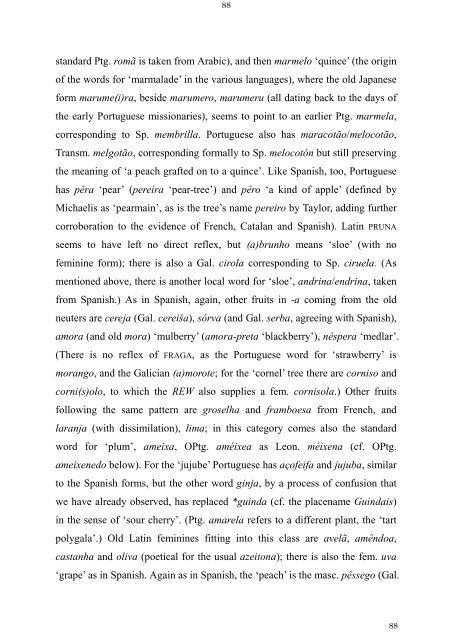The Latin Neuter Plurals in Romance - Page ON
The Latin Neuter Plurals in Romance - Page ON
The Latin Neuter Plurals in Romance - Page ON
You also want an ePaper? Increase the reach of your titles
YUMPU automatically turns print PDFs into web optimized ePapers that Google loves.
88<br />
standard Ptg. romã is taken from Arabic), and then marmelo ‘qu<strong>in</strong>ce’ (the orig<strong>in</strong><br />
of the words for ‘marmalade’ <strong>in</strong> the various languages), where the old Japanese<br />
form marume(i)ra, beside marumero, marumeru (all dat<strong>in</strong>g back to the days of<br />
the early Portuguese missionaries), seems to po<strong>in</strong>t to an earlier Ptg. marmela,<br />
correspond<strong>in</strong>g to Sp. membrilla. Portuguese also has maracotão/melocotão,<br />
Transm. melgotão, correspond<strong>in</strong>g formally to Sp. melocotón but still preserv<strong>in</strong>g<br />
the mean<strong>in</strong>g of ‘a peach grafted on to a qu<strong>in</strong>ce’. Like Spanish, too, Portuguese<br />
has pêra ‘pear’ (pereira ‘pear-tree’) and pêro ‘a k<strong>in</strong>d of apple’ (def<strong>in</strong>ed by<br />
Michaelis as ‘pearma<strong>in</strong>’, as is the tree’s name pereiro by Taylor, add<strong>in</strong>g further<br />
corroboration to the evidence of French, Catalan and Spanish). <strong>Lat<strong>in</strong></strong> PRUNA<br />
seems to have left no direct reflex, but (a)brunho means ‘sloe’ (with no<br />
fem<strong>in</strong><strong>in</strong>e form); there is also a Gal. cirola correspond<strong>in</strong>g to Sp. ciruela. (As<br />
mentioned above, there is another local word for ‘sloe’, andr<strong>in</strong>a/endr<strong>in</strong>a, taken<br />
from Spanish.) As <strong>in</strong> Spanish, aga<strong>in</strong>, other fruits <strong>in</strong> -a com<strong>in</strong>g from the old<br />
neuters are cereja (Gal. cereiša), sôrva (and Gal. serba, agree<strong>in</strong>g with Spanish),<br />
amora (and old mora) ‘mulberry’ (amora-preta ‘blackberry’), nêspera ‘medlar’.<br />
(<strong>The</strong>re is no reflex of FRAGA, as the Portuguese word for ‘strawberry’ is<br />
morango, and the Galician (a)morote; for the ‘cornel’ tree there are corniso and<br />
corni(s)olo, to which the REW also supplies a fem. cornisola.) Other fruits<br />
follow<strong>in</strong>g the same pattern are groselha and framboesa from French, and<br />
laranja (with dissimilation), lima; <strong>in</strong> this category comes also the standard<br />
word for ‘plum’, ameixa, OPtg. améixea as Leon. méixena (cf. OPtg.<br />
ameixenedo below). For the ‘jujube’ Portuguese has açofeifa and jujuba, similar<br />
to the Spanish forms, but the other word g<strong>in</strong>ja, by a process of confusion that<br />
we have already observed, has replaced *gu<strong>in</strong>da (cf. the placename Gu<strong>in</strong>dais)<br />
<strong>in</strong> the sense of ‘sour cherry’. (Ptg. amarela refers to a different plant, the ‘tart<br />
polygala’.) Old <strong>Lat<strong>in</strong></strong> fem<strong>in</strong><strong>in</strong>es fitt<strong>in</strong>g <strong>in</strong>to this class are avelã, amêndoa,<br />
castanha and oliva (poetical for the usual azeitona); there is also the fem. uva<br />
‘grape’ as <strong>in</strong> Spanish. Aga<strong>in</strong> as <strong>in</strong> Spanish, the ‘peach’ is the masc. pêssego (Gal.<br />
88









